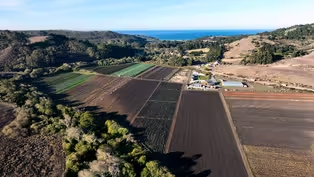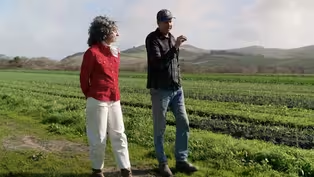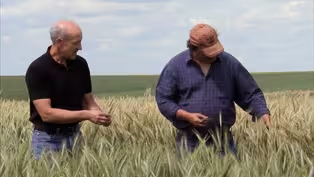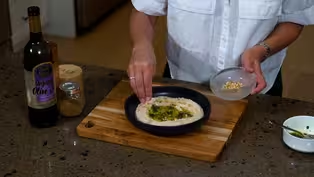
Growing Opportunities for Refugees
Clip: 8/16/2024 | 5m 33sVideo has Closed Captions
Visit a farm run by the International Rescue Committee that provides refugees a place to grow.
Visit a West Sacramento farm run by the International Rescue Committee, or IRC. The organization provides refugees a place to grow their own vegetables, and sell them for a profit, at a farmer’s market.
Problems playing video? | Closed Captioning Feedback
Problems playing video? | Closed Captioning Feedback
America's Heartland is presented by your local public television station.
Funding for America’s Heartland is provided by US Soy, Sustainable Agriculture Research and Education, Rural Development Partners, and a Specialty Crop Grant from the California Department of Food and Agriculture.

Growing Opportunities for Refugees
Clip: 8/16/2024 | 5m 33sVideo has Closed Captions
Visit a West Sacramento farm run by the International Rescue Committee, or IRC. The organization provides refugees a place to grow their own vegetables, and sell them for a profit, at a farmer’s market.
Problems playing video? | Closed Captioning Feedback
How to Watch America's Heartland
America's Heartland is available to stream on pbs.org and the free PBS App, available on iPhone, Apple TV, Android TV, Android smartphones, Amazon Fire TV, Amazon Fire Tablet, Roku, Samsung Smart TV, and Vizio.
Providing Support for PBS.org
Learn Moreabout PBS online sponsorship♪♪♪♪♪ Liang: My name is Liang Ma.
I am a farmer here.
Narr: Liang Ma seems proud of the sheer variety of crops he and his wife grow.
I grow many kind of vegetables such as strawberry, tomatoes, cucumbers, eggplants, luffa radishes, beans.
broccoli beans, corn, peanuts, sweet potatoes, yam, taro, watermelon, bitter melon, garlic, green onion, a lot.
Narr: He wants to make it clear his wife is the real farmer of the family.
But she's out of town today.
Or else she'd be doing the talking.
But he's happy to share the importance of the International Rescue Committee.
New Roots Farm near downtown Sacramento, California.
Liang: Like many people, when I started living in the U.S., I do not have a job to do.
Language... English language is barriers.
Narr: Liang now has a full time job, but during the growing season, weekends and evenings are spent tending to their plot.
The farm is operated by the International Rescue Committee, a global nonprofit organization founded in the 1930s providing life saving services to immigrants and refugees and people in crisis torn countries.
In this region, the need is clear.
From 2010, to 2020, 9% of refugees arriving in the United States resettled in California, many of them here in the Sacramento area.
There are often support programs available, but for many, the connection to growing food is vital.
Ram Khatiwada, Urban Roots founder, farm manager and himself a refugee, explains why.
Ram: The core problem for humanity is these people get displaced and there are millions and million people struggling to save their life and find a good home where they can survive.
They can gain their life, they can grow, have their families, they can have their freedom, they can have their rights, and they can have their own choices how to live, practice their culture and practice their recipes and language.
Narr: The program offers an opportunity to grow produce and learn farming techniques like nutrient and pest management.
Farmers can also sell their goods at the weekend farm stand.
Liang Mas strawberries are a top seller.
Ram: These are actually a place where you can find the food that is grown and eaten by different part of the world.
For example, if I have people from ten different countries, you are lucky to see ten different varieties of crops here that is culturally appropriate and that they are used to in their, country, in their recipes.
They come here and learn, they grow food, they take food to home.
So they of course save the money.
They sell the produce here.
And then we keep about 15% of the cost for our packaging, handling resources.
And all of that.
Raise about 85% of the money goes to them.
Narr: Tynya Beverly is the Leader of the Black and Brown Farm Collective, an organization that shares space here working with the refugees and immigrants.
Tynya: In order for people to be able to learn a new language or learn a new culture, they have to have a secure foundation.
So this farm provides economic development is one piece of their plan.
There's case management.
I mean, they're learning all this stuff, but when you do that, then they can relax when they have a little money, they can relax and they can, you know, put their energy into learning the language, put their energy in learning the culture and not have to worry about surviving.
Narr: That piece of mind is vital for Bhutanese refugee, Tek Chamligi.
He's getting a lesson today from Ram about the importance of using crop waste to replenish soil nutrients Tek: On the refugee camp, uh, we don't have land, so we have a small tent.
We keep it, stay in, small tent and, uh, a lot of, uh, trouble over there because if the wind coming, sometimes we, uh, uh... the tent to blow up so much, terrible thing over there, but right here, better.
Ram: Once you pull the person from drowning stage when you bring it out, support is -- should not be limited to that.
After that, the person has to live and eat and grow and thrive.
For that, we need support.
And here that is possible under New Root by providing, gardening land, small plot of land for families to grow food so they can have their choice of growing their produce there, they always like to have.
They miss it for a long time, because they have to run away from their country and their geography and their, their... their, uh, local areas.
Tynya: When you bridge a gap like that, all of a sudden you're in someone's heart space.
Something happens when you you can give someone food without attachment and no expectations, and you keep showing up and you're consistent in your community.
You change lives.
Video has Closed Captions
Clip: 8/16/2024 | 4m 24s | A farmer builds housing for his workers right on the land. (4m 24s)
Diversified Farms – Harvesting Health
Video has Closed Captions
Clip: 8/16/2024 | 4m 39s | Our health expert explains why farms that grow a diverse range of crops may be better for our health (4m 39s)
Video has Closed Captions
Clip: 8/16/2024 | 4m 35s | Meet farmers growing wheat in a very dry climate. (4m 35s)
White Bean Dip – Farm to Fork with Sharon Profis
Video has Closed Captions
Clip: 8/16/2024 | 4m 1s | Discover how to make a white bean dip appetizer. (4m 1s)
Providing Support for PBS.org
Learn Moreabout PBS online sponsorship

- Food
Christopher Kimball’s Milk Street Television
Transform home cooking with the editors of Christopher Kimball’s Milk Street Magazine.












Support for PBS provided by:
America's Heartland is presented by your local public television station.
Funding for America’s Heartland is provided by US Soy, Sustainable Agriculture Research and Education, Rural Development Partners, and a Specialty Crop Grant from the California Department of Food and Agriculture.




